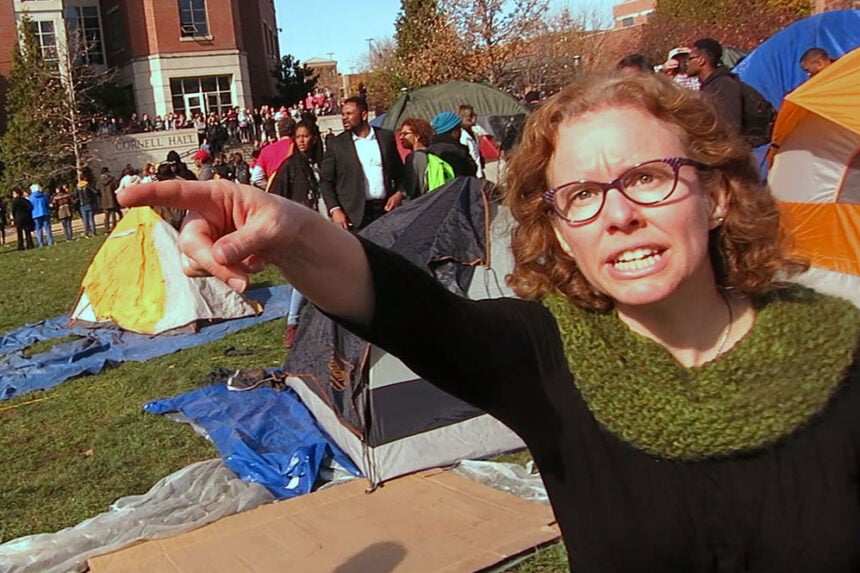Professor Jonathan Turley, of George Washington University Law School, recently proposed in the Harvard Journal of Law & Public Policy reforms that universities should be required to implement in order to avoid federal suits and the loss of government subsidies. The list includes,
- Guaranteeing that speakers appear on campus under the same costs and conditions, regardless of their views (or opposition to their views);
- Committing to disciplinary action of students or faculty who block classes, lectures, or speeches by violent acts or threats of violence;
- Committing to the expulsion or termination of students or faculty who physically assault speakers or others seeking to exercise free speech or the right to peaceful assembly;
- Committing to disciplinary action of students or faculty who block classes, lectures, or speeches through disruptive conduct inside classrooms, halls or other spaces reserved for such presentations;
- Enforcing a presumption that the exercise of free speech outside of the school (including statements on social media) for faculty or students is generally not a matter for school sanctions or termination;
- Committing to due process of students and faculty who are disciplined for exercising free speech rights, including the right to discovery of patterns of bias or inconsistent treatment in other controversies;
- Barring restrictive “free speech zones” and other exclusionary zones for free expression (other than rules barring demonstrations, disruptions, or exhibits in classrooms, halls, or other spaces used for lectures, presentations, and events);
- Barring student governments or organizations from sanctioning or censuring fellow students for their exercise of free speech without a clear and narrowly tailored standard as well as the approval of a university body;
- Barring faculty from sanctioning, censoring, or retaliating against students for their political, social, or religious statements or values (subject to protected exceptions for religious-based institutions);
- And barring faculty from requiring that students adhere to, adopt, or endorse political, social, or religious positions as a condition for any class, program, or benefit (subject to protected exceptions for religious-based institutions).
Certainly, I would be the last to deny—having spent 40 years in the academy—that what is euphemistically called “higher education” has turned hysterically intolerant. Universities are ruthlessly suppressing opposition to woke agendas, while professors join campus agitators in inciting violence against politically incorrect speakers. I, myself, was the object of such attacks while a guest lecturer at Hamilton College in November 2017. During my tumultuous visit, campus agitators acted out against me, and the college president as well as the faculty assembly fell into line with the troublemakers. In their irrationality, they accused me of saying things in my lectures that were never there.
But I doubt Professor Turley’s proposed reforms would do much to remedy the situation we both deplore. Nothing would solve this problem short of the complete replacement of politically woke faculty and of those in government service who are advancing the takeover. It is difficult to imagine that the inflamed ideologues and professional agitators to whom Turley refers will desist from their activities merely because they are given different rules. The academic left doesn’t believe in those rules and will contemptuously reject any attempt to force compliance with what they would protest are racist, sexist, and homophobic restraints on their professional behavior.
The problem we face—particularly, but no longer exclusively, in humanities departments—vastly exceeds that of American “reeducators” who sought to “denazify” German universities after World War II. Most German university professors before Hitler’s ascent to power were not committed Nazis but typically voted for the parties that supported the Weimar Constitution. Some professors eventually joined the new order to get ahead (like German jurist and political philosopher Carl Schmitt); but others, like Karl Jaspers and Hans-Georg Gadamer, providing they were certified as Aryans, were allowed to stay on for varying periods of time, even if they were not in sympathy with the Third Reich.
But the hardened ideological fanaticism now characterizing the American academy is far less easily controlled than German universities that “collaborated” with Hitler’s rule. Although some academic radicals may be doing nothing more than playing along, many do believe in the totalitarian ideology they zealously defend. There is also no authority in a position to “dewoke” American universities, and those government and accreditation agencies that the radicalized administrators consult are not about to change what for them is a congenial milieu.
This is not entirely a counsel of despair. Although nothing short of a political and cultural transformation will remove the problem that Professor Turley laments, we can at least look for remedials to lessen the effects of a grave social disease. I do not discourage attempts—even such as Turley’s—to force universities to be a little more tolerant, and I hope my friend Amy Wax sues the pants off the University of Pennsylvania Law School if she is pushed out of her position for being insufficiently politically correct. But I would not count on turning the academic institutions around until we first liberate them from the cultural left.
Image: Melissa Click pointing (from Mark Schierbecker, CC BY-SA 4.0, via wikimedia commons)



Leave a Reply